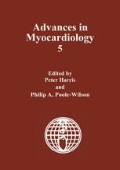Abstract
The mechanisms and regulatory factors involved in cardiac proteolysis are incom- pletely understo0d. Agents that interfere with lysosomal function (e.g., chloroquine, leupeptin, methyladenine) cause a 25–30% reduction in the overall rate of protein degradation. In the same hearts, however, the rate of myosin breakdown remains unchanged. Disaggregation of microtubules with colchicine is accompanied by a 15% reduction in the rate of degradation of total protein and of myosin. In the same hearts, the degradation of “organellar” protein, including mitochondrial cytochromes, is reduced by over 30%. Thus, it appears that the degradation of different classes of cardiac proteins may be accomplished and regulated by different processes. Lysosomes are important in overall proteolysis, but appear not to be involved in the regulation of myosin breakdown. Microtubules are also involved in the proteolytic process, and appear to be especially important for the breakdown of proteins from mitochondria and perhaps other organelles.
Access this chapter
Tax calculation will be finalised at checkout
Purchases are for personal use only
Preview
Unable to display preview. Download preview PDF.
References
Amenta, J. S., Sargus, M. J., and Baccino, F. M. 1977. Effect of microtubular or translational inhibitors on general cell protein degradation. Biochem. J. 168:223–227.
Ballard, F. J. 1977. Intracellular protein degradation. In: P. N. Campbell and W. N. Aldridge (eds.), Essays in Biochemistry. Vol. 13. pp. 1–37. Academic Press, New York.
Barrett, A. J. 1980. The many forms and functions of cellular proteinases. Fed. Proc. Fed. Am. Soc. Exp. Biol. 39:9–14.
Crie, J. S., Ord, J. M., Wakeland, J. R., and Wildenthal, K. 1983. Inhibition of cardiac proteolysis by colchicine. Biochem. J. 210:63–71.
Dean, R. T. 1980. Regulation and mechanisms of degradation of endogenous proteins by mammalian cells: General considerations. In: K. Wildenthal (ed.), Degradative Processes in Heart and Skeletal Muscle. pp. 3–30. North-Holland, Amsterdam.
Grinde, B., and Seglen, P. O. 1981. Role of microtubuli in the lysosomal degradation of endogenous and exogenous protein in isolated rat hepatocytes. Hoppe-Seyler’s Z. Physiol. Chem. 362:549–556.
Hoh, J. F. Y., McGrath, P. A., and Hale, P. T. 1978. Electrophoretic analysis of multiple forms of rat cardiac myosin: Effects of hypophysectomy and thyroxine replacement. J. Mol. Cell. Cardiol. 10:1053–1076.
Kolset, S. O., Tolleshaug, H. and Berg, T. 1979. The effects of colchicine and cytochalasin B on uptake and degradation of asialo-glycoproteins in isolated rat hepatocytes. Exp. Cell Res. 122:159–167.
Libby, P., Ingwall, J. S., and Goldberg, A. L. 1979. Reduction of protein degradation and atrophy in cultured fetal mouse hearts by leupentin. Am. J. Physiol. 237:F35-F39.
Ord, J. M., Wakeland, J. R., Crie, J. S., and Wildenthal, K. 1983. Mechanisms of degradation of myofibrillar and nonmyofibrillar protein in heart. In: E. Chazov, V. Saks, and G. Rona (eds.), Advances in Myocardiology. Vol. 4, pp. 195–199. Plenum Press, New York.
Ord, J. M., and Wildenthal, K. 1980. Increased release of δ-aminolevulinic acid from protein during inhibition of protein synthesis in heart: Evidence for the extensive reutilization of heme in cardiac protein metabolism. Biochem. Biophys. Res. Commun. 93:577–582.
Rannels, D. R., Kao, R., and Morgan, H. E. 1975. Effect of insulin on protein turnover in heart muscle. J. Biol. Chem. 250:1694–1701.
Ridout, R. M., Decker, R. S., and Wildenthal, K. 1978. Chloroquine-induced lysosomal abnormalities in cultured foetal mouse hearts. J. Mol. Cell. Cardiol. 10:175–183.
Seglen, P. O., and Gordon, P. B. 1982. Methyladenine: Specific inhibitor of autophagic/lysosomal protein degradation in isolated rat hepatocytes. Proc. Natl. Acad. Sci. U.S.A. 79:1889–1892.
Ward, W. F., Chua, B. L., Li, J. B., Morgan, H. E., and Mortimore, G. E. 1979. Inhibition of basal and deprivation-induced proteolysis by leupeptin and pepstatin in perfused rat liver and heart. Biochem. Biophys. Res. Commun. 87:92–98.
Wibo, M., and Poole, B. 1974. Protein degradation in cultured cells. II. The uptake of chloroquine by rat fibroblasts and the inhibition of cellular protein degradation and cathepsin B1. J. Cell Biol. 63:430–440.
Wildenthal, K. 1971. Long-term maintenance of spontaneously beating mouse hearts in organ culture. J. Appl. Physiol. 30:153–157.
Wildenthal, K., and Crie, J. S. 1980. The role of lysosomes and lysosomal enzymes in cardiac protein turnover. Fed. Proc. Fed. Am. Soc. Exp. Biol. 39:37–41.
Wildenthal, K., and Crie, J. S. 1980. Lysosomes and cardiac protein catabolism. In: K. Wildenthal (ed.), Degradative Processes in Heart and Skeletal Muscle. pp. 113–129. North-Holland, Amsterdam.
Wildenthal, K., Dees, J. H., and Buja, L. M. 1977. Cardiac lysosomal derangements in mouse heart after long-term exposure to nonmetabolizable sugars Circ. Res. 40:26–35
Wildenthal, K., Griffin, E. E., and Ingwall, J. S. 1976. Hormonal control of cardiac protein and amino acid balance. Circ. Res. 38(Suppl. 1):138–144.
Wildenthal, K., Wakeland, J. R., Morton, P. C., and Griffin, E. E. 1978. Inhibition of protein degradation in mouse hearts by agents that cause lysosomal dysfunction. Circ. Res. 42:787–792.
Wildenthal, K., Wakeland, J. R., Ord, J. M., and Stull, J. T. 1980. Interference with lysosomal proteolysis fails to reduce cardiac myosin degradation. Biochem. Biophys. Res. Commun. 96:793–798.
Author information
Authors and Affiliations
Editor information
Editors and Affiliations
Rights and permissions
Copyright information
© 1985 Springer Science+Business Media New York
About this chapter
Cite this chapter
Wildenthal, K., Crie, J.S., Ord, J.M., Wakeland, J.R. (1985). The Role of Lysosomes and Microtubules in Cardiac Protein Degradation. In: Harris, P., Poole-Wilson, P.A. (eds) Advances in Myocardiology. Advances in Myocardiology. Springer, Boston, MA. https://doi.org/10.1007/978-1-4757-1287-2_10
Download citation
DOI: https://doi.org/10.1007/978-1-4757-1287-2_10
Publisher Name: Springer, Boston, MA
Print ISBN: 978-1-4757-1289-6
Online ISBN: 978-1-4757-1287-2
eBook Packages: Springer Book Archive

